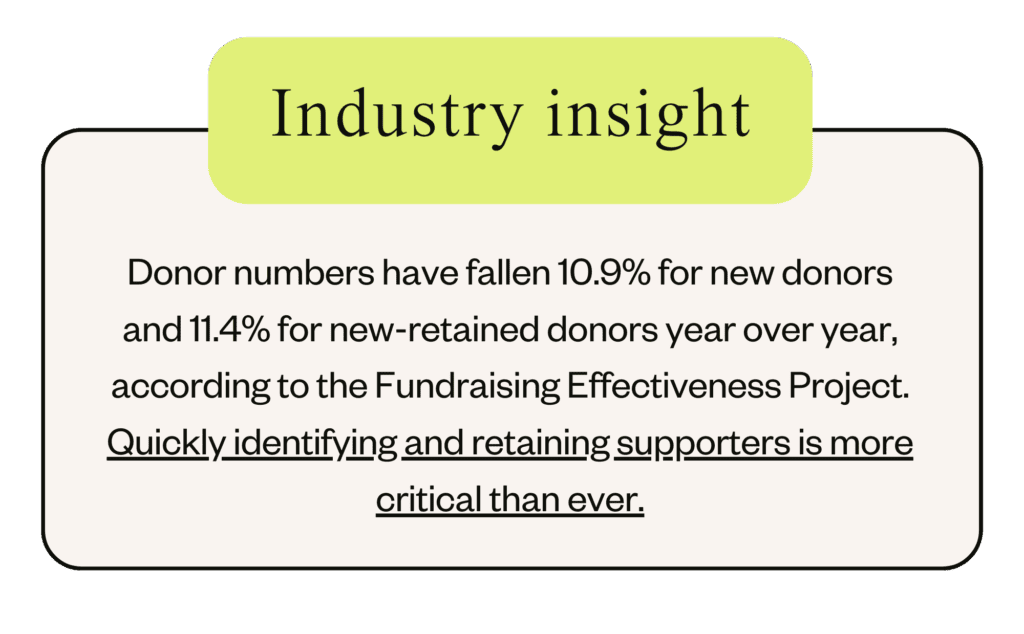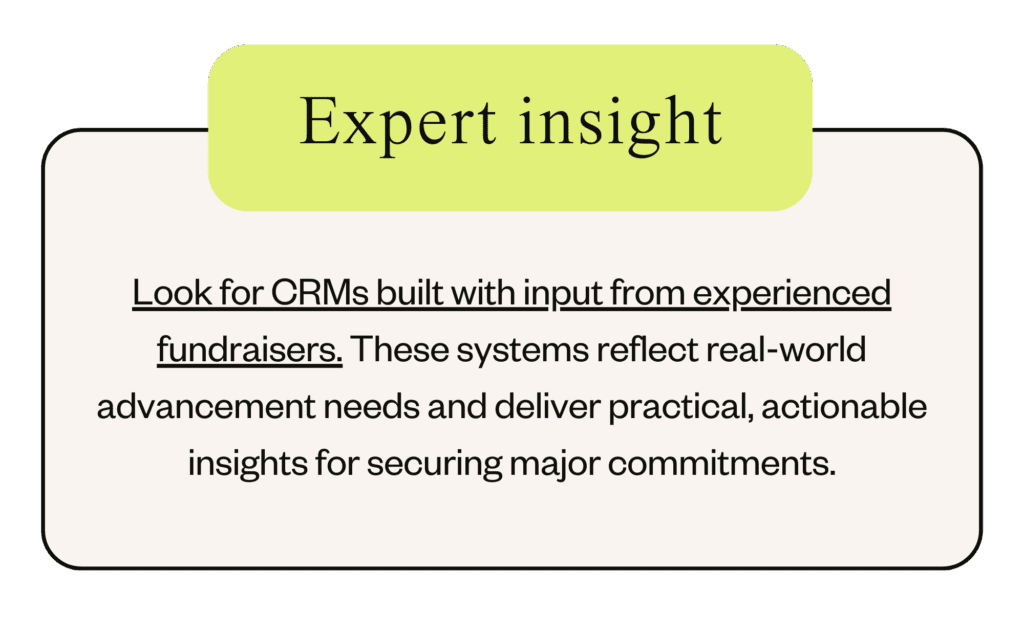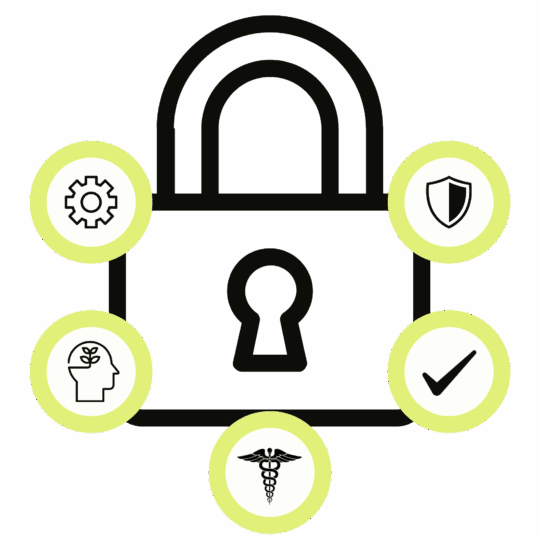
A nonprofit CRM (customer relationship management) system—often called donor management software—helps organizations manage relationships with their donors, volunteers, and supporters. Unlike sales-focused CRMs, it’s built for the unique needs of nonprofit work. It tracks donations, engagement, events, and volunteer activity all in one place.
Centralizing this data gives you a complete picture of your supporters. It makes it easier to build stronger, more meaningful donor relationships and act when opportunities arise. The right CRM streamlines your fundraising efforts and improves communication.
Knowing the key nonprofit CRM features to look for will help you choose a system that empowers your team to raise more, work smarter, and make a greater impact.
Comprehensive donor database and relationship management
A fundraising CRM should give you a complete, accurate view of every supporter. It should manage complex household and organization relationships, track multiple addresses, and record gifts, event attendance, and interactions in each donor’s profile.
Legacy systems often complicate this with silos, workarounds, duplicates, and missing history. These gaps limit insight and make it harder to understand your donors’ behavior. If you’re facing these kinds of challenges, it may be time to switch to a new fundraising CRM.
Leading CRM platforms use complete profiles to power donor relationship management. With every detail in one place, fundraisers can segment donors, personalize outreach, and act quickly to build lasting connections. A clear, intuitive interface makes it easy for your team to find what they need without extra clicks or confusion.
Data integration and clean-up
The right CRM brings data together from every system your organization uses. This includes online giving platforms, event tools, email marketing systems, and accounting software. Real-time updates let your team act with confidence.
Older CRMs often cause delays and errors. Manual re-entry, mismatched formats, or slow syncing lead to incomplete records and poor decision-making.
Top-tier systems maintain accuracy through automated checks, standardized formats, and consistent governance rules. This keeps donor records clean, reports reliable, and outreach effective based on facts instead of guesswork.
Donor management and engagement tracking
A strong nonprofit CRM tracks every interaction a supporter has with your organization. This includes campaign responses, volunteer activity, peer-to-peer fundraising participation, and communication preferences. When all engagement details are in one place, it’s easier to plan the right next step.
Many CRMs offer only static records of donors’ past activity. Without real-time tracking of engagement signals and moves management tools, fundraisers can’t advance relationships or move prospects toward their next gift. Opportunities will be lost simply because the right data wasn’t visible at the right time.
Industry insight: Donor numbers have fallen 10.9% for new donors and 11.4% for new-retained donors year over year, according to the Fundraising Effectiveness Project. Quickly identifying and retaining supporters is more critical than ever.

Effective CRMs monitor donor activity and flag behavior changes, such as a sudden drop in giving or increased event participation. AI-powered tools suggest the best next steps to keep relationships moving forward.
Communication tools and donor segmentation
An effective nonprofit CRM groups donors by giving history, capacity to give, and stage in their donor journey. These segments let you deliver tailored messages across email, phone, text, and events. Relevant, personalized communication keeps engagement high and builds stronger connections.
Basic segmentation or costly customization limits many CRMs, resulting in generic outreach that donors ignore. Without real-time data integration, timing messages for the best response is harder.
High-performing CRMs store full communication history and preferences, then use them to create personalized outreach and automate follow-ups. This ensures every donor receives the right message, in the right format, at the right time.
Major gift management
The most capable nonprofit CRMs support the entire cultivation process for major gift prospects—tracking each stage, managing moves, and recording every interaction that shapes the relationship with a major donor. A clear pipeline view allows your team to focus on the donors most likely to make a transformational impact.
Avoid CRMs that rely on costly add-ons or manual workarounds to manage major gifts effectively. Without built-in tools, fundraisers may miss signals or lose track of high-value opportunities.
Leading platforms integrate real-time wealth data directly into donor profiles. This ensures your team always has current insights to guide outreach and prioritize cultivation efforts.
Expert insight: Look for CRMs built with input from experienced fundraisers. These systems reflect real-world advancement needs and deliver practical, actionable insights for securing major commitments.

Gift processing and payment handling
A well-built nonprofit CRM makes it easy and fast to process gifts of all types, including handling complex pledge commitments, recurring donations, bulk gift entries, and matching gifts. Efficient processing keeps revenue moving and frees staff to focus on building relationships.
Some CRM systems slow this down with manual steps, limited batch tools, or disconnected payment systems. Delays in processing create backlogs, postpone acknowledgments, and affect donor satisfaction.
Well-designed CRMs streamline every stage of gift entry. Integrated payment processing, automated matching, and high-volume transaction tools help teams work faster while maintaining accuracy. With fewer bottlenecks, acknowledgments go out quickly, and funds are available sooner.
Fundraising campaign management
An effective CRM makes it simple to plan, execute, and track multiple fundraising campaigns all at the same time. From capital drives to annual appeals, you need to be able to set clear goals, define priorities, and monitor progress in real time. This focus ensures every campaign stays on track and aligned with your overall fundraising strategy.
Without a central system, campaigns require juggling spreadsheets, disconnected tools, and guesswork. That slows execution and obscures fundraising results.
The strongest platforms combine segmentation, automation, and analytics to drive campaign success and keep your advancement strategy on track. They allow you to target the right audience, deliver timely outreach, and adjust your approach based on live performance data. With these tools, your team moves faster, engages more effectively, and raises more funds with less manual effort.
Event management
A nonprofit CRM should streamline every part of fundraising event management, from registration to attendance tracking to post-event follow-up. Integrating event data with donor profiles creates a complete record of engagement for each supporter. This connection makes it easier to identify opportunities for deeper involvement after the event.
Events are both fundraising and relationship-building moments. They bring supporters together, strengthen community ties, and open the door for future giving. Using disconnected systems wastes staff time and risks losing valuable follow-up opportunities.
An effective CRM platform integrates with event management tools to connect event activity directly to donor stewardship plans. This ensures every attendee receives timely acknowledgement, next steps are clear, and your team acts quickly on opportunities to deepen engagement.
Membership self-service
Nonprofit CRMs should either provide or integrate with a secure, branded portal where donors can view their giving history, view and download giving receipts, create fundraising forms, manage their memberships, and update their personal information. Allowing supporters to manage their own details reduces administrative work and keeps donor records accurate.
Self-service tools also build transparency and trust. Donors value seeing their contributions and engagement history without having to request it.
The best CRM platforms link these portals to fundraising and stewardship plans, ensuring that major contributors are acknowledged promptly, loyal supporters are celebrated, and new donors are welcomed right away. Consistent, relevant touchpoints like these keep engagement high year-round.
Grant coordination
A top-level nonprofit CRM makes it easy to track grants alongside donor fundraising, including recording deadlines, deliverables, and reporting requirements. Keeping all funding streams in one place reduces errors and saves staff time.
Grants often run in parallel with individual giving campaigns. When grant-related data is stored separately, it creates extra work and makes it harder to see the full fundraising picture.
The most effective CRM platforms use a unified approach that eliminates silos between grant and gift workflows. This ensures accurate reporting, smoother collaboration, and a clear view of how every funding source supports your mission.
Mobile and remote access to donor data
Access to real-time donor information from any location empowers your team to act quickly and stay connected. Whether in the office, at an event, or meeting a supporter face-to-face, fundraisers should be able to view profiles, update notes, and record interactions instantly. This ensures information is accurate and available when it’s needed most.
Some CRM systems limit mobile access or offer only partial functionality outside the office. This delay leads to missed details, duplicate work, and slower follow-up.
Modern CRMs provide secure, mobile-friendly access to the same data and tools you have on your desktop. With real-time updates, your team is able to act immediately, keep records current, and maintain momentum with every donor interaction.
Automation and workflow efficiency
The right nonprofit CRM reduces manual work so your advancement team focuses on cultivating donors and building relationships. This increased human focus is one of the greatest benefits of incorporating AI into your fundraising. Automated workflows handle routine tasks like acknowledgment emails, portfolio updates, and gift entry. Custom sequences ensure that each donor follows a consistent, personalized donor journey from first contact to long-term donor stewardship.
All too often, automation tools are limited or require complex setups that don’t match real-life fundraising workflows. This creates gaps in follow-up and inconsistent donor experiences, leading to lost opportunities.
Advanced CRM platforms allow you to design workflows that reflect your advancement strategy. They automate repetitive steps, trigger next actions based on donor activity, and simplify portfolio management. This alignment with your fundraising workflows ensures a successful CRM implementation and smooth rollout.
Reporting and data analytics
An advanced nonprofit CRM gives fundraisers and leaders clear, real-time visibility into performance, such as dashboards that track campaign progress, donor retention, and gift pipeline health. Instant access to these valuable insights enables your team to act quickly and make informed data-driven decisions.
Older reporting tools often require weeks for custom reports or manual searches for key metrics. Without timely data, it’s harder to spot trends, adjust strategy, or measure ROI.
Leading platforms put operational reporting and deep analytics directly in your hands. They connect every data point—from donor behavior to fundraising outcomes—so you identify gift opportunities, refine your advancement approach, and demonstrate impact to your stakeholders.
Customization, scalability, and integration
Effective CRMs adapt easily to the evolving needs of your organization, whether you’re a small team or a large institution. This means customizable workflows, flexible data models, and scalable architecture that grows with your fundraising program.
Some platforms offer fixed features that limit your ability to tailor processes or handle increasing complexity. As your organization evolves, rigid systems slow growth and require time-consuming workarounds or costly add-ons.
Flexible nonprofit CRM solutions provide robust customization and seamless integration with other tools. Built on a cloud platform, they enable your team to configure workflows, connect data sources, and add new features without disrupting daily operations. This flexibility ensures your CRM remains a reliable foundation for advancement, no matter how your needs change.
Security and compliance
Strong security measures protect donor data and keep your organization compliant. These measures reduce risk, protect sensitive information, and build donor trust:

- Strong encryption: Data is encrypted while stored and during transfer, so sensitive information stays secure even if intercepted.
- SOC 2 Type II compliance: Independent audits verify that the platform meets strict standards for security, availability, confidentiality, and processing integrity.
- PCI DSS compliance: Payment processing meets industry standards to protect financial data and prevent fraud.
- HIPAA compliance: Required for organizations handling medical-related donor information.
- Employee vetting and training: Background checks and regular security training safeguard data.
Finding the best CRM solution for your nonprofit
Selecting the right CRM starts with understanding your nonprofit’s unique needs, from donor management to reporting and volunteer tracking. Comparing features, pricing models, and user experience helps narrow your choices.
Our analysis of the 11 best nonprofit CRMs breaks down these factors to help you find the ideal fit. It also offers a step-by-step guide covering everything from defining your nonprofit’s requirements to budgeting and scheduling demos.
Drive advancement with the right nonprofit CRM
The right nonprofit CRM isn’t just a place to store your donors’ information—it drives advancement by streamlining workflows and revealing key opportunities. With comprehensive donor profiles, automation, and real-time analytics, it helps your team take the right actions at the right time. A CRM platform built for advancement lets your team focus on cultivating your supporters instead of wrestling with technology.
Choosing a CRM with the right capabilities is an investment in your nonprofit’s future. Look for tools that centralize data, improve collaboration, and adapt as your needs evolve. When your CRM system aligns with your workflows, your team works smarter, engages more effectively, and advances your mission faster.
Be the first to read our resources.
The world is changing quickly—and our resources help you stay on top of it all. Sign up to get new insights, success stories, and more, sent right to your inbox.




